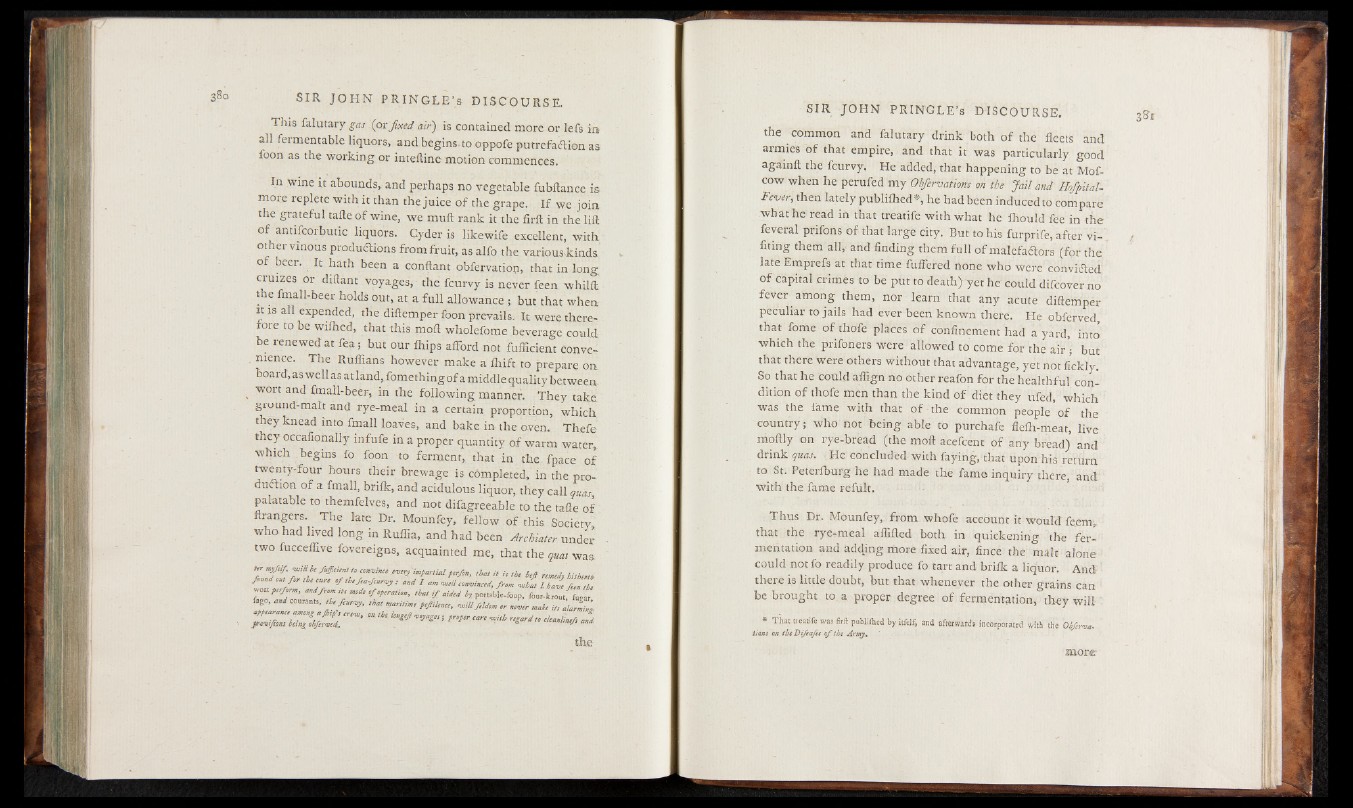
This falutary gas (prefixed air) is contained more or lefs in
all fermentable liquors, and begins.to oppofe putrefaction as
foon as the working or inteftine motion commences.
In wine it abounds» and perhaps no vegetable fubftance is
more replete with it than the juice of the grape. If we join
the grateful tafte of wine, we mull rank it the firft in the lift
of antiscorbutic liquors. Cyder is likewife excellent, with
other vinous productions from fruit, as alfo the various kinds
of beer. It hath been a conftant obfervatiop, that in long,
cruizes or diftant voyages, the fcurvy is never feen whilft
the fmall-beer holds out, at a full allowance ; but that when
it is all expended, the diftemper foon prevails. It were therefore
to be wifhed, that this moil wholefome beverage could
be renewed at fea; hut our Ihips afford not fufficient convenience.
The Ruffians however make a Ihift to prepare on
board, as well as at land, fomethingof a middle quality bet ween,
wort and fmall-beCr, in the following manner. They take
ground-malt and rye-meal in a certain proportion, which
they knead into fmall loaves, and bake in the oven. Thefe
they occafionalfy infufe in a proper quantity of warm water,
which begins fo foon to ferment, that in the fpace of
twenty-four hours their brewage is completed, in the production
of a fmall, brifk, and acidulous liquor, they call Las
palatable to themfelves, and not difagreeable to the tafte of
ftrangers. The late Dr. Mounfey, fellow of this Society
who had lived long in Ruffia, and had been Archiater under
two fucceffive fovereigns, acquainted me, that the quas was
Tm.le/uS!ci,f ' » convince every impartial forfeit, that it i, tie left remedy tithe,to.
J° " f " of the fea-feurvy : and I am well convinced, from what l have feen the
, ‘Uifr™ md‘ ’/operation, that if aided by. portable-Coup, har.krmt, foear
ftgo, and courants, the fcurvy, that maritime feftilence, willf,Idem or never make i„ alarliL
the common and falutary drink both of the fleets and
armies of that empire, and that it was particularly good
againft the fcurvy. He added, that happening to be at Mof-
cow when he perufed my Objervations on the Jail and Hofpital-
Fever, then lately publifhed*, he had been induced to compare
what he read in that treatife with what he ffiould fee in the
feveral prifons of that large city. But to his furprife, after vi-
fiting them all,- and finding them full of malefactors (for the
late Emprefs at that time fuffered none who were convicted
of capital crimes to be put to death) yet he could difeover no
fever among them, nor learn that any acute diftemper
peculiar to jails had ever been known there. He obferved
that fome of thofe places of confinement had a yard, into
which the prifoners were allowed to come for the air'; but
that there were others without that advantage, yet not fickly.
So that he could affign no other reafon for the healthful condition
of thofe men than the kind of diet they ufed, which
was the fame with that of the common people of the
country; who not being able to purchafe fleffi-meat, live
moftly on rye-bread (the moft acefcent of any bread) and
drink quae. He concluded with faying, that upon his return
to St. Peterfburg he had made the fame inquiry there, and
with the fame refult.
Thus Dr. Mounfey, from whofe account it would feem;
that the rye-meal affifted both in quickening the fermentation
and addjng more fixed air, fince the malt alone
could not fo readily produce fo tart and brifk a liquor. And
there is little doubt, but that whenever the other grains can
be brought to a proper degree of fermentation, they will-
* That treatife was firft publithed by itfelf, and afterwards incorporated with the Ot/erva-
tians on the Di/ea/es of the Army*
more